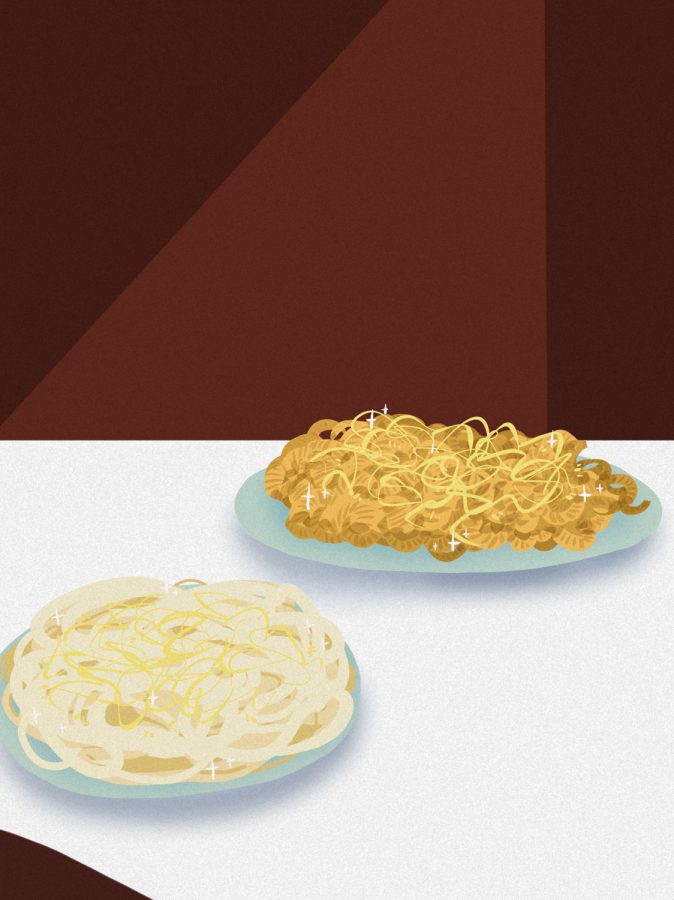Changing wheats is not ‘impastable’
Hard durum wheat is commonly used to make pasta, but soft durum wheat is easier to mill, more accessible in area
A WSU graduate study conducted a study at Black Cyprus to test which wheat pasta people preferred.
November 4, 2021
A WSU doctoral student conducted a study to test which type of wheat locals prefer for their pasta: soft durum wheat or hard durum wheat.
Traditionally, hard durum wheat is used to make pasta, but a new type of soft durum wheat was created over two decades ago by WSU researchers through cross-breeding. Craig Morris, the researcher who created soft durum wheat, died Oct. 25.
Hard durum wheat is typically ground in specialized mills, and it is hard to make flour from, said Jessica Murray, doctoral student in the WSU School of Hospitality Management. Soft durum wheat can be grown in more areas and milled into flour more easily. It may also help alleviate food insecurity because it can be grown in more areas than hard durum wheat.
“They’d be able to grow this in the exact same place it’s already adapted for — and be able to mill it and use it more in their homes to help with that food insecurity in those regions,” Murray said.
“So the idea is that breeding this to be a softer product it’ll retain all of the flavor and protein and color profile of that pasta flour that we’re used to, but it’ll be a lot easier to mill,” Murray said.
She conducted a pasta tasting study at Black Cypress in October to compare pastas created through two different milling ways. The first was stone-ground whole wheat pasta and the other was roller-milled refined pasta. Both pastas were seasoned with olive oil and cheese.
Participants compared the two pastas based on appearance before eating, Murray said. Then, they tried the two pasta samples while answering questions about local food and perceptions of food during COVID-19.
The study had 133 participants and took place over two hours, she said. Another session of the study is being planned. Everyone who participated received a $20 gift card to Black Cyprus.
The study was conducted to understand people’s perception of local food in their home as well as their preferences for healthier whole wheat pasta, she said.
Besides the in-person pasta study, researchers will also conduct a study online with about 200-300 participants across the U.S. Overall, the study provides pioneering research on the uses of soft durum wheat.
Alecia Kiszonas, research biologist for wheat health, genetics and quality for the United States Department of Agriculture, said Morris was the director of WSU’s Western Wheat Quality Laboratory when he created soft durum wheat.
“I think he was just interested in expanding the use of durum into … products beyond pasta, and couscous — and really making it accessible for milling in any kind of mill,” Kiszonas said.
Hard durum wheat is only used for pasta and couscous, she said. Soft durum can create a variety of products beyond pasta like different breads, pastries and cookies. Soft durum wheat can be ground to a soft flour similar to what is available in stores while hard durum is coarser and gritty.
Hard durum wheat is grown in the Dakotas, as well as California and Arizona, Kiszonas said. Soft durum wheat is grown in the Pullman area, as well as areas in southern California and Arizona.
Morris holds a patent through the USDA for soft durum wheat, Kiszonas said. Farmers can license their wheat to those who want to grow it. Porch Light Pizza uses stone-ground soft durum wheat.
Typically, refined pasta has been more popular, but whole wheat is gaining in popularity. It is hard to say how quickly the use of soft durum wheat will expand in commercial products in the U.S., she said.
“It’s very exciting to you know, think about expanding the consumption of soft durum,” she said.










